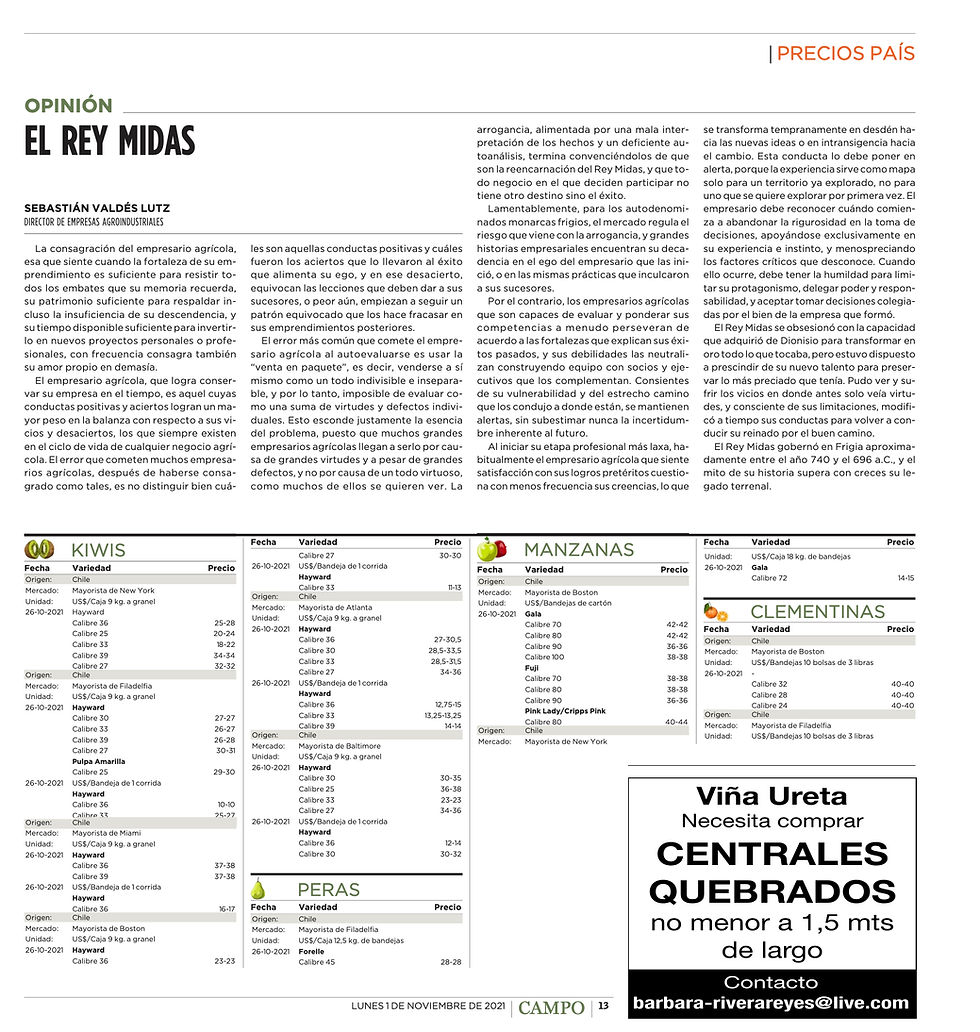KING MIDAS
- Sebastián Valdés

- Dec 11, 2021
- 3 min read
By Sebastián Valdés Lutz
"Revista El Campo" magazine, "El Mercurio" newspaper
November 1, 2021

The consecration of the agricultural businessman, the one who believes that the strength of his business is capable of resisting every onslaught he can possibly remember, that his fortune is capable of supporting the incapacity of his descendants, and that his time is plentiful enough to invest in new personal or professional projects, often over consecrates his self-love.
The agricultural businessman, who achieves maintaining his company through time, is the one whose positive conducts and assertiveness accomplishes more in the balance with his vices and mistakes, which are always present in the life circle of any agricultural business. The most common error many agricultural businessmen make, after consecrating himself as such, is that of not being able to distinguish well between those positive conducts and which were those achievements that made him successful and that feed his ego, and in making that mistake, they mistake the lessons they should give their successors, or worst, they will start to follow a mistaken pattern that will lead them to failure in future endeavors.
The most common mistake of agricultural businessman in his self-evaluation, is the use of “package sale”, in other words, to sell himself as an indivisible and inseparable, and therefore, impossible to evaluate as the sum of individual virtues and defects. This disguises the essence of the problem, because many big agricultural businessmen become such, as a cause of large virtues and despite big defects, not because of a virtuous whole, as many of them would like to appear. Arrogance, powered by flaw interpretation of facts and a deficient self-analysis, ends up convincing them that they are the reincarnation of King Midas, and that all the endeavors they decide to participate in, will therefore be successful.
Unfortunately for those self-styled Phrygian monarchs, it is the market who regulates the risk that comes with the arrogance, and big business histories find their demise in the ego of the businessman who started it, or in the same practices they inculcated in their successors.
On the contrary, those agricultural businessmen that are capable of evaluating and weighing their competence, often persevere based on the strength that explains their past successes, and their mistakes are neutralized by building teams with partners and executives which complement them. Aware of their vulnerability and of the narrow path that has driven them to where they are, they stay alert, never underestimating the uncertainty inherent to the future.
When getting to their more passive professional days, the agricultural businessman that usually feels satisfied with his past achievements and questions, less frequently, his beliefs, sooner transforms into disdain towards new ideas or intransigence towards change. This conduct must put him under alert, because his experience serves as a map only for a known territory, but not for a new one to be explored for the first time. The businessman must recognize when he begins abandoning his rigor in decision making, relying exclusively on his experience and instinct, and belittling unknown critical factors. When this occurs, he must have the humility to limit his protagonism, delegate power and responsibilities, and accept making wise decisions for the good of the company he has forged.
King Midas governed in Phrygia approximately between the years 740 and 686 B.C., and the myth of his story hugely overpowers his worldly legacy.




Comments